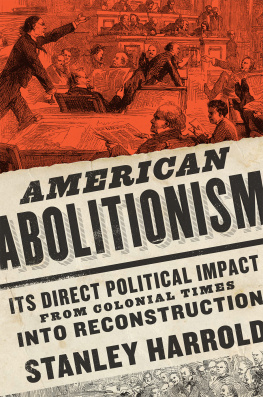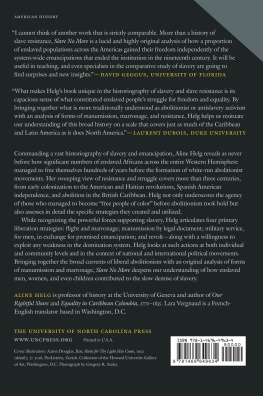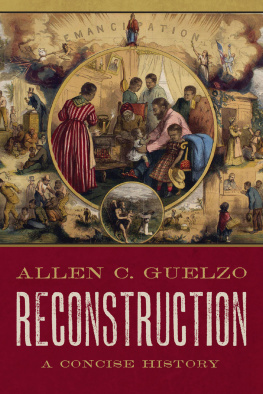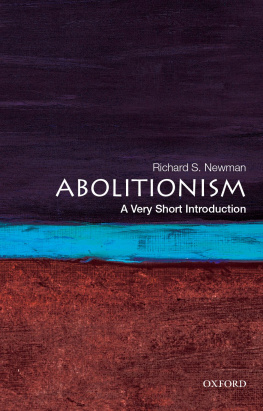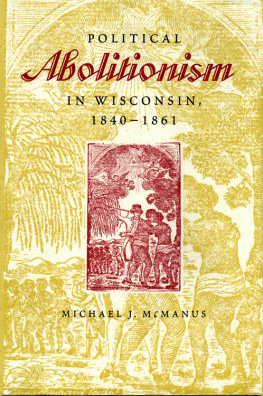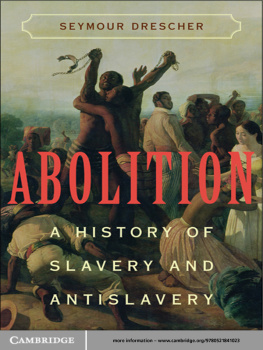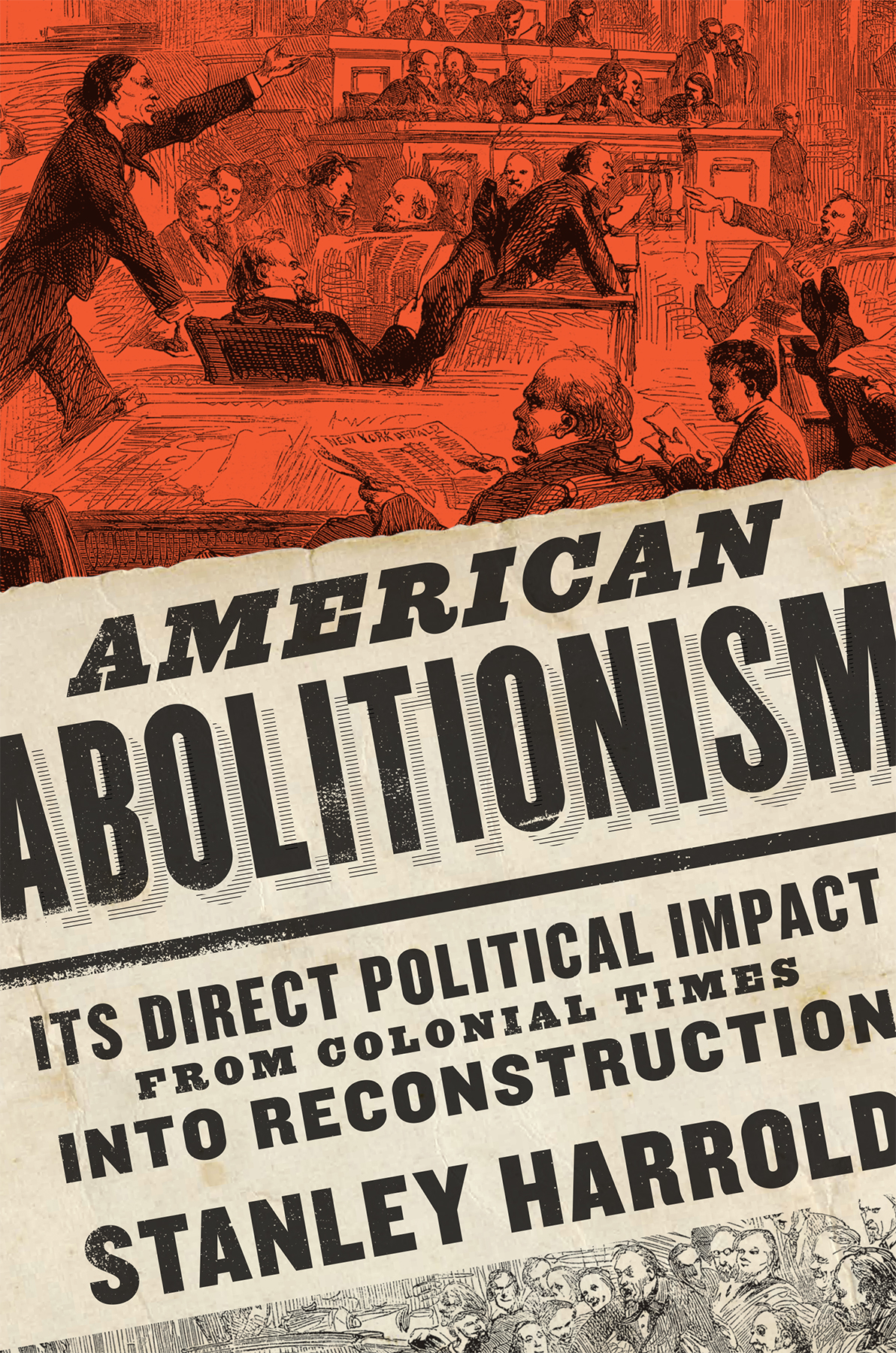
A Nation Divided: Studies in the Civil War Era
Orville Vernon Burton and Elizabeth R. Varon, Editors
American Abolitionism
Its Direct Political Impact from Colonial Times into Reconstruction
Stanley Harrold
University of Virginia Press
Charlottesville and London
University of Virginia Press
2019 by the Rector and Visitors of the University of Virginia
All rights reserved
First published 2019
Library of Congress Cataloging-in-Publication Data
Names: Harrold, Stanley, author.
Title: American Abolitionism : Its Direct Political Impact from Colonial Times into Reconstruction / Stanley Harrold.
Description: Charlottesville : University of Virginia Press, 2019. | Series: A Nation Divided: Studies in the Civil War Era | Includes bibliographical references and index.
Identifiers: LCCN 2018051832 | ISBN 9780813942292 (cloth : alk. paper) | ISBN 9780813942308 (ebook)
Subjects: LCSH : Antislavery movementsUnited StatesHistory. | AbolitionistsUnited StatesHistory. | SlaveryPolitical aspectsUnited StatesHistory. | United StatesPolitics and government17831865. Classification: LCC E 441 . H 36 2019 | DDC 326.80973dc23
LC record available at https://lccn.loc.gov/2018051832
Cover art: Details of A Scene in the Hall of Representatives, Illustrated London News, April 6, 1861. (Stuart A. Rose Manuscript Archives and Rare Book Library, Emory University)
For Judy and Emily
Contents
A century and a half earlier, an American movement to abolish slavery had begun in the British North American colonies. This book focuses on the movements leaders direct impact on and interaction with American politics, politicians, and government from about 1700 down to the movements end during the years following the Civil War. The book utilizes primary sources and historical studies produced since the late nineteenth century to better understand continuity and change in abolitionist political tactics and their results during successive eras. The goal is to develop a precise understanding of to what degree abolitionists, who belonged to a variety of factions, contributed directly, over an extended period of time, to the momentous but incomplete victory over slavery. Throughout, the book acknowledges that factors beyond organized abolitionism had a major role in determining the course of events that led to the Thirteenth, Fourteenth, and Fifteenth Amendments.
The story is as complicated as it is long. This is because the abolition movement changed over time in scope, short-term goals, personnel, leadership, organization, demeanor, and rhetoric. A gradualist approach and state-level action
Achieving an understanding of a direct abolitionist impact on politics and government is further complicated by varying definitions of who the abolitionists were and often vague understandings of their relationships to other movements. These other movements included a broader, far less radical political antislavery movement. Unlike abolitionists, most antislavery politicians, including those associated with the Federalist, Whig, Free Soil, and Republican Parties, rarely advocated general emancipation throughout the United States or black rights. Although there were significant exceptions that reflected abolitionist influence, most such politicians concentrated on blocking slavery expansion and defeating Slave Power in order to protect white northern interests. The other movements also included slave resistance, northward slave escape, and black efforts to achieve legal and social equality in the North. Despite proslavery claims to the contrary, and despite increasing abolitionist involvement, the great majority of African Americans who resisted slavery and escaped from it acted on their own. Black civil rights efforts in the North often involved abolitionists. But such efforts transcended the abolition movement.
Therefore, to avoid confusion, this book employs the precise definition of abolitionists that historian James M. McPherson presents in The Struggle for Equality: Abolitionists and the Negro in the Civil War and Reconstruction (1964). McPherson makes the point that historians err when they employ the word abolitionist to describe adherents of the whole spectrum of antislavery sentiment, which included nonabolitionist politicians and journalists.legislatures, and developed personal relationships with antislavery politicians. Other abolitionists undertook physical action against slavery in the South and thereby had a direct impact on politicians, legislative bodies, and sectional politics.
Throughout the movements existence, abolitionists also sought indirectly to shape political dialogue and government policy. They did so by preaching, holding public meetings, and circulating antislavery propaganda in attempts to shape popular opinion. Historians sometimes portray abolitionist petitioning campaigns as aimed primarily at popular opinion. But as mentioned above, forces beyond abolitionism influenced how people, North and South, perceived slavery and opposition to it. Therefore gauging the strength of abolitionist impact on popular opinion in comparison to the strength of such nonabolitionist forces is an impressionistic enterprise. So is evaluating the impact of popular opinion on politics and government. Such problems constitute the main reason why this book concentrates on direct abolitionist impact on colonial, state, and national governments. Through such tactics as petitioning, lobbying, and personal contacts with politicians, abolitionists demonstratively influenced broader, less principled, less comprehensive, and far less radical political antislavery efforts. These direct political tactics also influenced southern journalists and politicians who regarded them as threats to the expansion and perpetuation of slavery.
Direct abolitionist efforts to influence politics and government developed in several stages. First came Quaker abolitionists who lived in the Pennsylvania colony during the late seventeenth and early eighteenth centuries. They used their sectarian government, which overlapped with the colonys civil government, to push coreligionists toward freeing slaves. Second, from the 1750s through the early national period, northeastern abolitionists, including Quakers, evangelicals, and African Americans, petitioned and lobbied colonial and then state legislatures. During this phase some prominent northern politicians joined the newly formed abolition societies and became abolitionists. Third, beginning with the U.S. Constitutional Convention in 1787 and the convening of the First Congress in 1789, abolitionists expanded their direct efforts to include influencing the national government.
Its influence resurged in 1819 with the controversy over Missouri Territorys application to join the Union as a slave-labor state. The resurgence continued during the early 1820s with a debate over slavery within the state of Illinois. And it reached a peak in 1829 as abolitionists pressed Congress to end slavery in the District of Columbia. During the early 1830s, after a more doctrinaire movement for immediate general emancipation arose, abolitionists expanded their petitioning, lobbying, and personal contacts with antislavery politicians. In response proslavery politicians became even more defensive.
In 1840 three issues prompted immediate abolitionists to divide into four factions. The first issue concerned the role of women in abolitionist organizations. The second was the question of whether or not abolitionists should remain in churches that communed with slaveholders. The third (and most relevant for this book) consisted of disagreement over whether abolitionists should independently engage in
Next page
